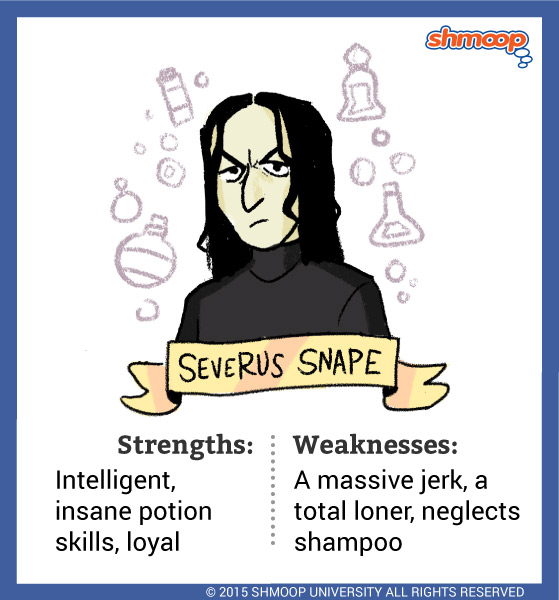Character Analysis

(Click the character infographic to download.)
Professor: Potions
House: Head of Slytherin
We really do love to hate Severus Snape. If Snape were in a real-world school, he'd probably either be sued, fired, or arrested for his near-abuse of his students. It's the fact that Snape is so outrageously extreme that draws our attention, makes him interesting, and raises some big questions. Let's check out Snape in action first.
"Silence," snarled Snape. "Well, well, well, I never thought I'd meet a third-year class who wouldn't even recognize a werewolf when they saw one. I shall make a point of informing Professor Dumbledore how very behind you all are." (9.4.30)
"YOU DON'T KNOW POTTER!" shrieked Snape. "HE DID IT, I KNOW HE DID IT –" [...]
"Fellow seems quite unbalanced," said Fudge, staring after him. "I'd watch out for him if I were you, Dumbledore."
"Oh, he's not unbalanced," said Dumbledore quietly. "He's just suffered a severe disappointment." (22.1.39, 44-45)
We get two very different Snapes here – one in control, using his power and his sarcasm as weapons; the other is completely out of control, almost beside himself with indignation at things not going his way (control freak, much?). Did Snape just lose it, or undergo a personality transplant? We'd argue no. In fact, these two sides of Snape are important for getting a better handle on the guy. The worst teacher ever, no sense of humor, mean, rude, and viciously sardonic Snape is one we know pretty well at this point. He hasn't really broken form since Book 1, after all. And we'll admit – he's pretty amusing at times in all his over-the-top awfulness.
But the other Snape is one who's a bit new – he's bitter and furious, he's not listening to reason, and he's kind of deranged. This is a Snape we haven't really seen before: an emotional one. As we start discovering in this book, Snape has some pretty intense emotions and seems to have a heck of a lot of hang-ups regarding his youth at Hogwarts.
"Have you been imagining some act of glorious heroism? Then let me correct you – your saintly father and his friends played a highly amusing joke on me that would have resulted in my death if your father hadn't got cold feet at the last moment." (14.3.81)
Snape never got over being bullied as a kid, which tells us some things. First, Snape is clearly fixated on issues of justice and fairness. Which seems bizarre since he's horribly unfair to his students. We should rephrase to say that Snape is concerned with his own fair treatment. The "injustice" he sees in Black's escape and in Dumbledore not really standing up for him, as he thinks he deserves, is what sends him over the edge.
Snape and Dumbledore's relationship is really fascinating – Snape seems to really value Dumbledore's approval and his reaction to Dumbledore's quiet dismissals of him throughout the book is almost that of a kid who thinks an adult is playing favorites. There's a lot of jealousy boiling around in Snape and it just overflows at the end of this book.
The other thing we learn through Snape being stuck in the past is a possible reason why Snape acts as horribly as he does to, well, everyone. In a way it's about power and control – he has it now, and he didn't have it as a student. As a student, he was a near-victim of the Marauders; as an adult, he can take his revenge on all the Marauder-like kids at the school – namely the cool Gryffindors with their Dumbledore hook-ups and their popularity.
But we still have a huge number of questions about Snape – his past and his actions are still very murky in a lot of ways. And his grudge match with Sirius doesn't fully explain why Snape became as unhinged as he did at the end of the book. So, some other questions to consider: Why does Dumbledore let Snape get away with his behavior in the first place? What's the history there? And why does Snape seem to particularly target Hermione? Does he resent her intelligence or is something else going on here?